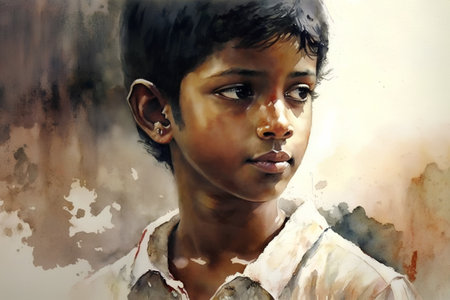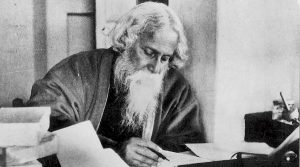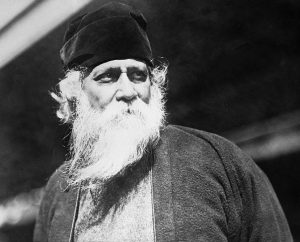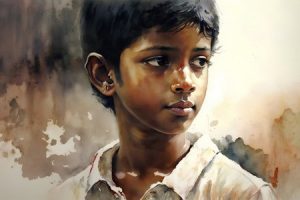
In Rabindranath Tagore’s short story “The Homecoming,” the character of Phatik stands out as a poignant representation of a child whose feelings and experiences go unnoticed and unacknowledged by those around him. Throughout the narrative, it becomes clear that Phatik’s struggles stem from a lack of understanding and empathy from the people in his life, ultimately leading to a sense of isolation and despair. This essay delves into the portrayal of Phatik in Tagore’s “The Homecoming”.
Phatik’s apathetic mother:
At the story’s beginning, Phatik is seen as a mischievous young boy who is unjustly shouted at by his mother. While rolling over a log, Phatik hurts his brother Makhan. It is seen that Makhan’s stubbornness led to him getting hurt. Consequently, Makhan rises “from Mother Earth blind” and rushes to beat up Phatik. Then he goes home crying.
As soon as Phatik came to his house, his mother angrily shouted, “So you have been hitting Mākhan again?” She did not even verify the truth of Makhan’s accusations and started reprimanding Phatik. When Phatik denied the allegations, his mother yelled, “Don’t tell lies! You have”. Although Phatik tried explaining his innocence, Makhan stuck to his false accusations, “Yes, mother. Phatik did hit me”. Unable to bear this injustice, Phatik hits his brother. Immediately, his mother took Makhan’s side, dragged Phatik aside, and beat him with her hands. This shows the apathetic nature of Phatik’s mother, who does not understand him and is biased towards his brother.
The discovery of sorrow in his aunt’s house:
Phatik finds himself caught in a whirlwind of events as the narrative progresses. Bishamber, his mother’s brother, takes the overjoyed Phatik to Kolkata to educate him. However, soon, this joy turns into sorrow. He becomes an unwelcomed “guest in his aunt’s house” and is “slighted on every occasion”.
No one acknowledged his feelings in his aunt’s house. The “cramped atmosphere of neglect” oppressed him. He finally mustered up the courage to ask his uncle one day, “Uncle, when can I go home?”. Bishamber responded by saying, “Wait till the holidays”. However, there was still a long way to go until the holidays, which would not arrive until October.
Phatik became the most “backward boy in the whole school” as he was not able to fit in his new surroundings. Neither was he able to answer the questions the teachers asked him, nor could he play with the other boys. Moreover, due to the loss of his book, Phatik was unable to prepare his lessons. This resulted in the teacher caning him mercilessly without understanding the reason for his problems.
The tragic consequences in Tagore’s story:
Subsequently, Phatik had a “bad headache with a fit of shivering”, an attack of malarial fever. He was afraid of becoming a burden to his uncle’s family, so he ran away. No one was able to trace him amid torrential rain. The police were able to trace him and bring him back. He was drenched in the rain and “muddy all over, his face and eyes flushed red with fever and his limbs trembling”. His aunt exclaimed, “What a heap of trouble this boy has given us! Hadn’t you better send him home?”. Phatik, in a fit of fever, replied that he was going home. This shows the apathetic atmosphere in which he lived, which results in his tragedy.
He became delirious with fever and started dreaming about being beaten by his mother, “Mother! I am telling the truth!”. Bishamber wiped his tears and took care of Phatik through the night. The doctor informed the uncle the next day that Phatik’s health was worsening. Hearing this, Bishamber sent for his mother. At last, when Phatik met his mother, he “slowly turned his head and without seeing anybody”, exclaimed, “Mother, the holidays have come”.
Conclusion:
Thus, Phatik’s character in Tagore’s “The Homecoming” provides a compelling argument about the detrimental effects of a lack of understanding and empathy towards children. Through the depiction of Phatik’s struggles and ultimate tragedy, Tagore highlights the importance of recognising and validating the emotions and experiences of young individuals.
It is also interesting to listen to Tagore’s Rabindrasangeet, which is available on Phalguni Mookhopadhaya’s Youtube Channel — https://www.youtube.com/@pmbrainware






Does your blog have a contact page? I’m having trouble locating it but,
I’d like to shoot you an email. I’ve got some recommendations for your blog you might be
interested in hearing. Either way, great website and
I look forward to seeing it grow over time.
Very nicely composed with a very good way of explaining the characteristic traits of Phatik…Thank You♥️
Very nicely composed with a very good way of explaining the characteristic traits of Phatik Chakraborty. Try to make the same explaining characteristical traits of the other characters of the story too ..Thank You♥️